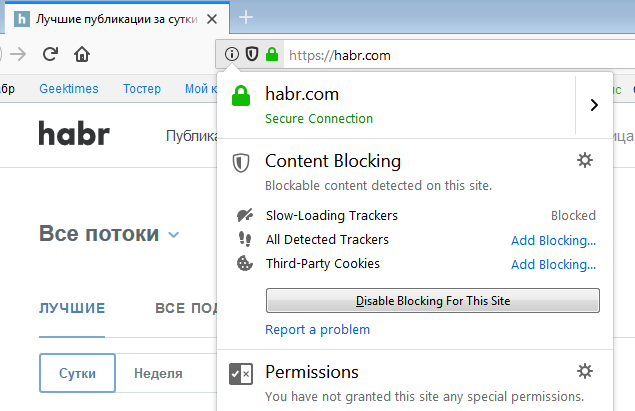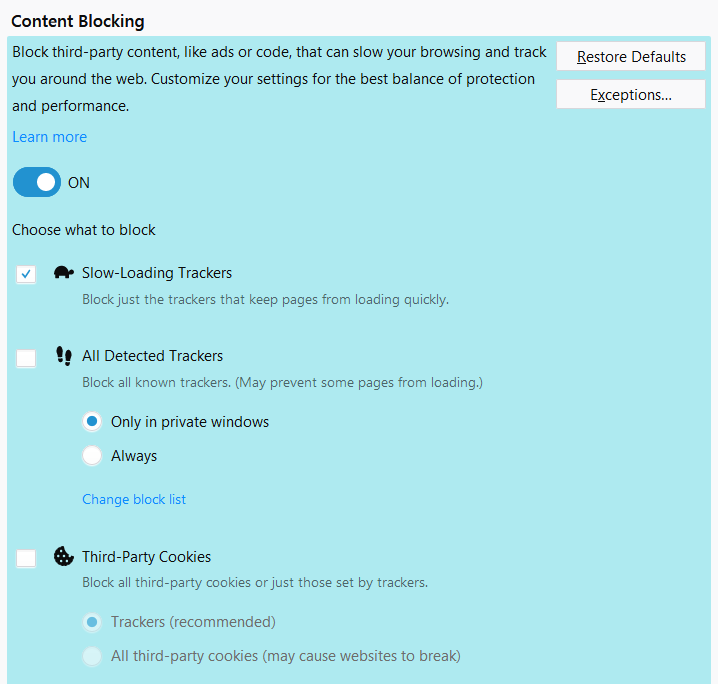Firefox will block users by default.
 Not everyone clearly understands how they are being tracked on the Internet. Someone knows about cookies and transparent pixels, but forgets about fingerprinting through HTML5 tags and other methods. Marketing firms invent new ways to track users, and we ourselves often help with this by logging into our Google and Facebook accounts. After this, tracking on other sites becomes a trivial task through Like buttons and affiliate advertising scripts.
Not everyone clearly understands how they are being tracked on the Internet. Someone knows about cookies and transparent pixels, but forgets about fingerprinting through HTML5 tags and other methods. Marketing firms invent new ways to track users, and we ourselves often help with this by logging into our Google and Facebook accounts. After this, tracking on other sites becomes a trivial task through Like buttons and affiliate advertising scripts.Unfortunately, ad blockers and scripts are not installed on every computer, and these scripts not only threaten security, but also slow down the loading of pages. Considering these factors, Firefox developers have announced a serious solution: in the near future, Firefox will start blocking online trackers from third-party sites by default .
Apparently, the introduction of these features is part of the ongoing merger of Firefox and Tor browsers .
In the next few months, a number of tools will be released on the main Firefox channel that implement the new Mozilla strategy. Now many of these features are implemented in the experimental version of Firefox Nightly. All technologies correspond to one of three tasks:
')
Acceleration of loading pages
The problem is that trackers significantly slow down the loading of pages. A Ghostery study showed that they accounted for 55.4% of the total load time, and the effect on slower compounds is even stronger. Therefore, Firefox will automatically block slow third-party trackers that slow down page loading.
Testing blocking third-party trackers Firefox Nightly will be held in September. If the tests are successful, the feature will be enabled by default in the main version of Firefox 63, which will be released on October 23, 2018.
If you have a Firefox Nightly browser and you want to participate in the study, then activate the corresponding option in the settings .

Intersite tracking lock
“In the real world, users do not expect hundreds of vendors to track their movement from store to store and spy on what products they are looking at and what they are buying,” writes Mozilla. - The same expectations of people online, but in reality vendors track their every step. Most browsers do not provide the level of privacy that users expect and deserve. ”
To prevent cross-site tracking, Firefox will, by default, delete cookies and block access to the local repository of third-party trackers. This feature is also implemented in Firefox Nightly and will be tested in September, but the introduction of the main release is expected with Firefox 65 (January 29, 2019).
Protection from questionable practices
Specific technologies have not yet been announced, but Mozilla promises that future versions of Firefox will by default protect against a number of questionable practices, such as fingerprinting and crypto-mining.
Mozilla recalls that the first start blocking popups in 2004 was the default. It was the right move - at that time pop-ups were considered the most annoying ad format. Many modern users do not even realize how often pop-up ads appeared in the early 2000s, and now this format has almost completely disappeared, including thanks to Mozilla.
It is hoped that blocking intersite tracking and most of the advertising trackers in 2018 will have the same positive effect as blocking pop-up windows in 2004.
The above functions can be manually activated in the Firefox Nightly browser from the Control Center , a panel that opens by clicking the i icon to the left of the address bar. In the latest version there appeared a section Content Blocking .

In the same section, you can configure exceptions, that is, disable blocking of third-party trackers for selected sites.

Thus, by default, Firefox will work just like special ad blockers. In fact, now Firefox borrows a list of blocking rules from the Disconnect extension.
New Firefox protection acts more aggressively than blocking third-party trackers in Safari, not to mention selective blocking of “inappropriate advertising” in Chrome. Recently, Microsoft has begun to embed Adblock Plus into the mobile version of Edge, but it is not enabled by default. However, the trend is evident. For many years, browsers simply displayed the content of the page with almost no changes and ran all the code. But now it has become clear that such an approach is harmful, it leads to a deterioration in the quality of the web: we received video clips with autoplay, banners with user tracking and a web page of tens of megabytes. Therefore, browsers take on a more active role in filtering malicious content. For example, Mozilla recently released the Firefox Focus mobile browser for Android, which completely blocks any advertising and third-party scripts on the Internet.
Firefox is the only popular browser that is not owned by a large corporation (Apple, Google or Microsoft).

Source: https://habr.com/ru/post/422109/
All Articles